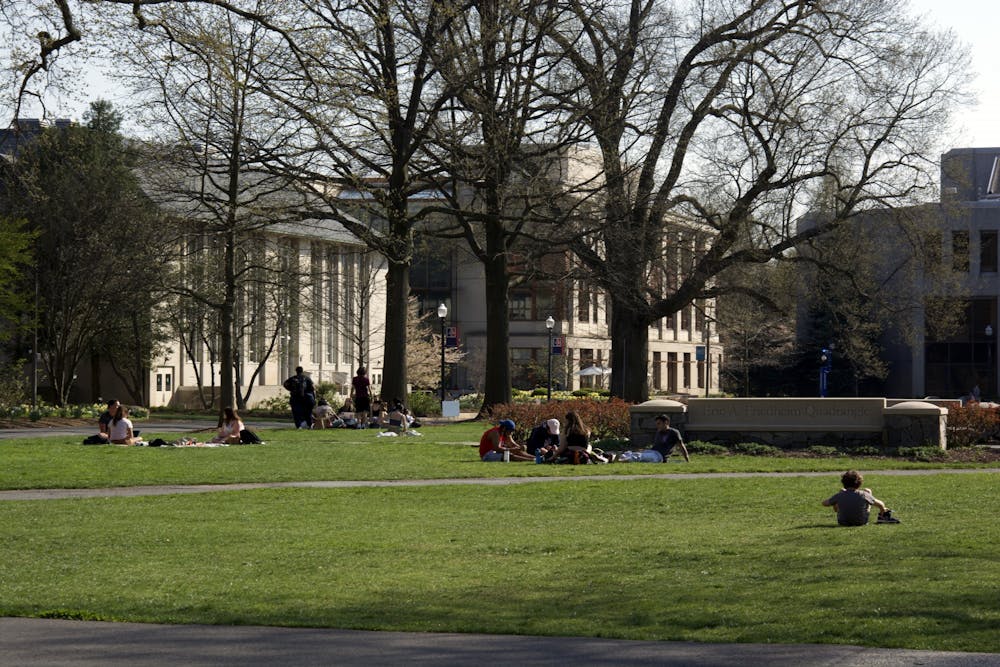The D.C. Zoning Commission approved the American University 2021 Campus Plan in a unanimous vote, the University announced on July 8.
The plan is the product of a years-long collaboration involving the AU Neighborhood Partnership and other local interests. It addresses campus growth and development over the next decade, focusing on strategic enrollment management, a balanced development program, engagement with off-campus students and the enforcement of AU’s off-campus parking policies.
“We are committed to ensuring that our work together continues to support AU’s institutional objectives and priorities while enhancing the quality of life for those who live in the neighborhoods surrounding campus,” President Sylvia Burwell wrote in the press release.
The Campus Plan itself is a 264-page document that outlines specifics of topics like development, transportation, campus improvements, off-campus life and neighborhood life. The plan is set to work with AU’s strategic plan, “Changemakers for a Changing World.”
The plan prioritizes housing, athletics, pedestrian safety and sustainability, according to Ed Fisher, assistant vice president of the University’s Office of Community and Government Relations.
The Zoning Commission still has to issue an official order before work can begin, so students and the community will not be impacted over the next few months, Fisher said.
“There won’t be any major disruption to the quad or any of those places on campus,” Fisher said. However, he said the biggest impact for students will be the University “aggressively fundraising” to build new residence halls and a new center for athletic performance.
The Eagle previously reported that community members expressed concerns about whether the planning had reached a “true consensus” as members of the Community Liaison Committee felt they weren’t being well represented. Fisher said that, while individual neighbors might have chosen to be less involved, the University did well at incorporating the CLC.
“I think that the campus plan process this time from what I understand was very unique compared to 2011 because it really was a collaborative, consensus-based process,” said Christian Damiana, the Advisory Neighborhood Commissioner for ANC District 3D07, which is primarily made up of AU’s campus.
As an ANC commissioner, Damiana was the only student to testify before the Zoning Commission. He spoke in his testimony about transportation and decreasing AU’s reliance on cars, a change in the housing options prioritizing apartment-style housing and a reconfiguration of student spaces on campus to improve campus life.
“I feel that this plan supports students,” Damiana said, adding that improving transportation was a priority.
“If DDOT proposes a new bike lane and the ANC supports it then AU most likely will as well, as long as there’s no objectionable impact,” Damiana said. “AU is going to be a real partner … they don’t have to work with us, they’re just going to continue to because it’s something they believe in.”
The enrollment cap was one of the more controversial questions throughout the hearing process because there was a fundamental disagreement between the school and some neighbors about whether or not AU should be allowed to continue to grow, Damiana said.
Off-campus parking will also be a continued focus of the new plan. Parking rules will be enforced by student ambassadors from the Parking and Transportation Team and a rigorous communication plan will ensure that all University students, staff and faculty will be aware of the rules.
Another aspect of the 2021 plan involves accommodating the University’s growing student body. The University wants to add 500 beds to campus and aims to update residence halls.
“We know that a lot of students move off-campus after their freshman or sophomore year,” Fisher said. “We would love for those students to stay and live on campus and have the AU campus really be their home.”
According to Fisher, specifics about who will occupy which residence halls were not discussed in the initial plan approval but will be later. However, Fisher notes that AU has committed to preserving Black Affinity Housing.
“No affinity housing will be removed without new replacement housing being designated and built for it,” Fisher said.
This is the first year that the University will host Black Affinity Housing on campus.
“D.C. has a massive housing crisis right now, so making sure that AU can provide as much housing as possible for AU students only makes the housing crisis less difficult for other DC residents that need to find places to live,” Damiana said. “And it encourages students to really build a connection with AU that they might not get if they’re living off-campus.”
Damiana said that renovations to Mary Graydon Center will be one of the most influential parts of the plan.
“I think it’s really, really important and a really great way to ensure that we’re reinvigorating student life and making sure that people are connecting with AU not just in an academic way, but also as a community,” he said.





